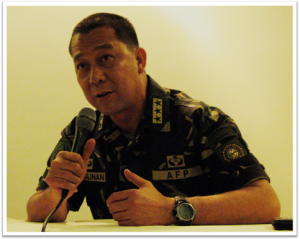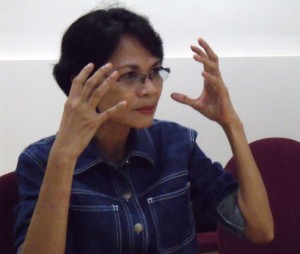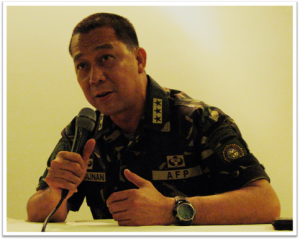CLARK FREEPORT, Pampanga.—A human rights group in Central Luzon is blaming former President Gloria Macapagal Arroyo for the increased incidence of human rights violations here in her home province Pampanga.
Aurora Broquil, president of the group Defend Central Luzon, said seven intelligence units have been deployed in Pampanga alone since late last year, including those from the Air Force, Army, Intelligence Service of the Armed Forces of the Philippines (ISAFP), Philippine National Police, and even the National Bureau of Investigation. The number, she said, excludes the regular units of the AFP and PNP now deployed within Central Luzon.
Broquil said this is the reason Pampanga has been “terrorized.”
“Can you imagine napakaliit ng Pampanga para i-deploy ang seven intelligence units… That was the time na nililinis ang Pampanga, kailangang linisin dahil darating si GMA (Pampanga is too small to have seven intelligence units. That was the time they were clearing up Pampanga because GMA was arriving),” Broquil said in a talk with members of nongovernment groups attending an investigative reporting workshop on human rights conducted by VERA Files recently.
At the same forum, Lt. Gen. Gaudencio Pangilinan, AFP Northern Luzon chief who took over the command in July, assured NGOs that he would pursue a campaign of zero violation as part of his plan to get soldiers to internalize human rights principles.
 He appealed to human rights groups not to be too hard on the AFP and PNP. “We are doing everything in our capacity to get away from the spectre left by martial law. Give us the chance to prove that we are protectors of the people and their rights,” Pangilinan said.
He appealed to human rights groups not to be too hard on the AFP and PNP. “We are doing everything in our capacity to get away from the spectre left by martial law. Give us the chance to prove that we are protectors of the people and their rights,” Pangilinan said.
Pangilinan told VERA Files that it’s possible that there are indeed more military units deployed in Pampanga over and above the regular ones, but he pointed out that this is part of operational control and that the number of troops varies from place to place.
Pangilinan said he would study the matter, although he denied Broquil’s accusation that the units were there to harass, much less terrorize, communities.
“If it’s true that there are seven intelligence units there, it’s for good, not for anything sinister,” he said.
Broquil said the intelligence units were assigned to Pampanga in preparation for Arroyo’s assumption of the post of representative of the province’s second district after the elections in May.
Pangilinan said a detachment was indeed organized and assigned to Lubao town, but it was withdrawn after University of the Philippines professor and Lubao native Randy David warned that the soldiers could be used to harass voters.
The arrest and torture of suspected activists have been on the rise in the past year, Broquil said, citing the case of Rodwin Tala, Lenin Salas, and three others who were arrested without a warrant on Aug. 3, blindfolded and tortured.
The five men were alleged members of a leftist armed group called “Rebolusyonaryong Hukbo ng Bayan” and charged with illegal possession of firearms.
It wasn’t until the next day, however, that their mothers were allowed to see them.
Gloria Tala said when she went to see her son Rodwin at the Provincial Police Office, his hair was burnt, his clothing disheveled, his body black and blue, and his chest showed signs of cigarette burns.
She said she tried taking video footage of her son using her cellphone, but an unnamed police officer snatcher her cellphone from her, while another shouted at them.
“Mga putang ina nyo, pagpapapatayin ko kayo. Kahit mga babae kayo, pumapatay ako ng babae (I’m going to kill you. It doesn’t matter that you are women. I kill women),” Tala quoted the unidentified police officer as saying.
Fanny Salas, whose son Lenin was also arrested, said she found her son weak and almost unable to stand. She quoted her son as telling her, “Mommy, tinortyur ako (Mommy, I was tortured).”
Both mothers were prevented from speaking with their sons at length or even approaching them, and even offering them bottles of water.
Salas said she tried not to let her son out of her sight. “Para akong asong sunud ng sunod sa anak ko dahil takot na akong mawala siya sa paningin ko (I was like a dog because I kept following my son around. I was afraid to let him out of my sight),” she sobbed.
Broquil explained that acts of torture do not only involve those inflicted on victims and their immediate families, but on other relatives. Threats and harassment have been experienced by those who are in some way connected to the victims.
 She said military operations are now focused more on urban districts where there are many government projects, “quashing all forms of opposition” and “sow(ing) fear” not only towards progressive organizations but entire communities.
She said military operations are now focused more on urban districts where there are many government projects, “quashing all forms of opposition” and “sow(ing) fear” not only towards progressive organizations but entire communities.
Broquil said after United Nations Special Rapporteur Philip Alston’s report on human rights violations in the Philippines came out in 2006, killings in Central Luzon decreased.
But they resumed in 2008 when her group observed a new “phenomenon of forced disappearances” with new methods of harassments. There have been cases of abductions “without traces of evidence,” which she described as those in which the abductors were almost impossible to identify.
Last week, a report on extrajudicial killings in the Philippines by lawyer Al Parreño and funded by The Asia Foundation and the United States Agency for International Development (USAID), found that “Pampanga had the most number of cases (of extrajudicial killings) with the record of having thirty-seven (37) cases and forty-one (41) victims. Majority of the Pampanga cases still remain unsolved as the suspects are still unidentified and some of the cases are dismissed. Most of the victims in Pampanga are elected government officials or alleged members of the NPA.”
Parreño’s study analyzed 305 incidents of extrajudicial killings over 2001 to 2010, the nine-year-period during which Arroyo was president.

Meanwhile, Salas, Tala and their companions have been charged with illegal possession of firearms, ammunitions and explosives, offenses which are non-bailable.
In late August, the Salas family filed a writ of amparo, a remedy that covers extralegal killings, enforced disappearances and threats to an individual’s right to life, liberty and security. The first hearing of the five detainees’ case is set for Sept. 28.–Neil Lim, Maxine Tanya Hamada, Jonal Javier, Richie Supan, Denise Fontanilla, Farah Sevilla, Ryan Gan, Homer Yabut and Eladio Perfecto
